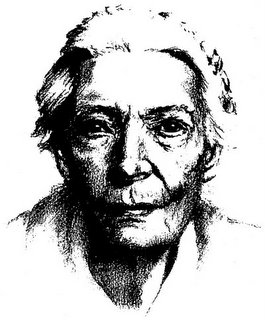25 Years Without Dorothy Day

The New York Times featured a nice little piece on the Catholic Worker today:
From the Bowery to Guantánamo With Dorothy Day
The Catholic Worker movement has now officially lasted 25 years beyond the death of its founder, Dorothy Day, and looks sturdy enough to last another 25.
There is something of a riddle in that. The harsh rules that limit the shelf lives of utopian impulses would seem to spell doom for an institution as shapeless and impractical as Day's. Lots of organizations want to lift up the poor, oppose war and reshape society, but few try to do so with no governing structure, no official means of support, no paid staff members and - since Day's death on Nov. 29, 1980 - no leader.
That oddity was on full display last week on the Lower East Side, where about 80 people - Catholic Worker members and former members, and their relatives and friends - gathered in a cramped, dingy auditorium at Maryhouse, the group's home for women on East Third Street, to celebrate a Mass in Day's memory.
The stage was closed off with white bedsheets draped on a string. Down in front, between a lectern and a Yamaha keyboard, a potted ficus and a table lamp gave the makeshift sanctuary the feeling of a living room. Pictures of Woody Guthrie, Gandhi and Martin Luther King Jr. lined the walls. There was lots of rumpled gray hair and baggy overcoats, women in turtlenecks and men with canes, a few young couples, a child or two.
The motley gathering was at the literal center of commemorations for Day, the Greenwich Village bohemian and journalist who converted to Catholicism and founded the Catholic Worker in 1933 with a fellow radical, Peter Maurin. She spent her final years at Maryhouse, leaving behind a mountain of writings but not much else in the way of stuff or structure. Her movement has been called not an organization but an organism, an anarchic experiment whose most improbable achievement may be its own survival.
Members still dedicate themselves to voluntary poverty, nonviolence and hard work. They make soup, give away coats, visit prisoners and the sick, protest against war and publish a newspaper that sells, as it did in the 1930's, for a penny.
read the rest.






4 Comments:
The interesting thing about the new Catholic Worker house here in town??? Apparently, none of them are Catholic.
The Catholic Worker movement has been one of the sources of inspiration to a number of urban "neo-monastic" communities that are springing up in the inner cities. Thes communities have recently been written about in The Christian Century and Christianity Today, and the phrase "re-monking the church" has been coined. That would be "re-monking" the Protestant church of course, since the Roman Catholic church was of course never "de-monked" to begin with. These new communities often wholeheartedly embrace voluntary poverty and seek to serve the poorest and most marginalized of the inner city. Just as with the Catholic Worker movement apparently, they often have "no governing structure, no official means of support, no paid staff members". And per Susan's comment, these "new-monastic" communities, as they are coming to be called, are not Catholic, though most of them would probably balk and be offended at being called "protestant." The ones I know personally often refer to themsleves as "small c catholic" to emphasize their wish for unity in the universal church. Many of their influences, however, are monastic and therefore necessarily Catholic almost by definition.
I guess I know a lot about these folks because I guess I am sort of one of them, although as you know Mark (and Susan), I am in the process of conversion to the Roman Church.
This movement is one of the many faceted developments that has been spawned in part by the "emerging church conversation" (they don't like to be called a movement, at least in part because they are such a diverse group and not monolithic by any means) that is taking place (and being much and harshly critiqued) largely within certain evangelical (or formerly evangelical) circles that are rethinking much of evangelical theology and finding it wanting. There is a lot of theological "cross-polination" going on....
Maybe you and your readers are already aware of all of what I write here, and I didn't mean to go off on a big treatise, but your post and Susan's comment put me in mind of these things that I am actually still quite close to.
Peace to you
A-
It's interesting. I was at a meeting recently where somebody said that Catholics (or perhaps we should say "some Catholics") are starting to look like evangelicals. To which my response was: Yeah, and some evangelicals are starting to look like Catholics!
Cross-pollination is a good word I think!
Mark
Wow, that's amazing. I didn't know that her anniversary was this time of year. She was actually friend with Catherine Doherty who died Dec. 14, 1985 - her 20th anniversary is this coming Wednesday. I'll be writing about it for sure. Connections, more connections.
Post a Comment
<< Home